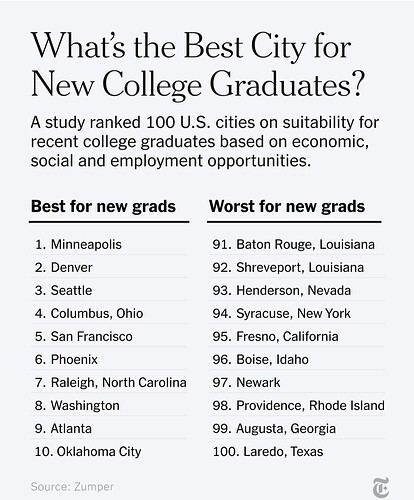Our kids are on board with this plan. It helps that we have a top-tier CC in town, and it’s free for California residents
College needs to be expensive because it’s the easiest way to make sure you hire only rich kids oops I mean kids who can communicate well and have professional manners.
Otherwise you might accidentally hire poor people and minorities oops I mean kids who aren’t as articulate.
And the winners and losers of “best city to go to after graduating” are…
My dad used to have “Streets of Laredo” on his playlist when I was a kid. Maybe Laredo’s gone downhill since then.
I can’t really take a list like that seriously if they aren’t going to have some minimum MSA population like 1M to be included.
We’re #1! We’re #1!
Aren’t 3 of the top 5 cities filled with tents though? Does it average them into the cost of housing?
I’d also be interested in which “social metric” they’re using. Because I several relatives that are in that demographic of “recent college grad” and the thing each of them really wanted was a place where they can find others their age with some overlap of interests. Something that you really can’t capture in a metric easily.
In fact, my niece–who is in nursing–did the travelling nurse route for a couple of years and has found a city (in Washington state) that she really likes and checks most of her “social metrics” check boxes.
Only in the downtown areas. [/red]
But I believe the “cost of housing” isn’t based on what people actually spend but what are the listed rents for a location.
I’ve been informed by locals that Oklahoma City is where the queers in Oklahoma concentrate for safety, so there is that social aspect of acceptance for some young people, even if not queer.
I expect the students in this article are not too concerned about the value of their university education.
Shame they didn’t allow comments on that article. Would have been great reading.
My wife turned the air blue here with her comments.
They see value in establishing social connections, it would seem.
Didn’t want to start a new thread so kinda related. My alma mater is discontinuing lectures.
Not sure if this has already happened in American universities. I imagine a lot of students stopped going to in-person lectures during/after COVID. Having studied for actuarial after completing a non-related degree, I do prefer working at my own pace rather than sit through a lecture - as long as I’m able to send in a question every now and then.
Our goddaughter is taking completely asynchronous online classes for the next couple of years after attending a more traditional college.
Some classes might have recorded lectures, but her assignments right now seem… a bit questionable, but perhaps I’ll warm up to it.
They are reading passages and are required to annotate so many sections with thoughts or feedback. Then, they are again assigned to go respond to other people’s points and support so many of them and argue against so many of them. The class is surrounding project management, conflict resolution, interpersonal skills, something like that.
The chatter, chatter, chatter just for the sake of filling so many bubbles doesn’t seem to be doing much for her educationally. But I may just not see it, and only see the annoyance and "ughhh I have to slap out five more of these"
However, I’m thinking of my Math/Stats degree and I’m not sure how I’d feel without lectures.
Lectures were super important to me. I feel like recorded/zoom lectures could be as good or better, but from the online courses I’ve taken, we aren’t quite there yet.
I attended the International Congress of Actuaries last year in Sydney and didn’t feel like there was a lot lost by watching the lectures online (for the lectures I missed) vs in-person. The videos were TED talk quality, which I find good enough. They were taking questions from people watching online as well as in person.
Since I went to school, the average commute time to the universities I attended has increased substantially. It would benefit some of these students to come in three days a week rather than five. Lectures are easier than workshops, labs or tutorials to replicate online and may give the students an ability to reduce the number of contact days. Of course, if you live on campus that’s not such an issue.
BF teaches both asynchronous online courses and in person.
Some of what he’s teaching is pretty hands on. Learning to use the physical equipment is part of what he’s teaching so that really can’t be done online. But some topics can be.
